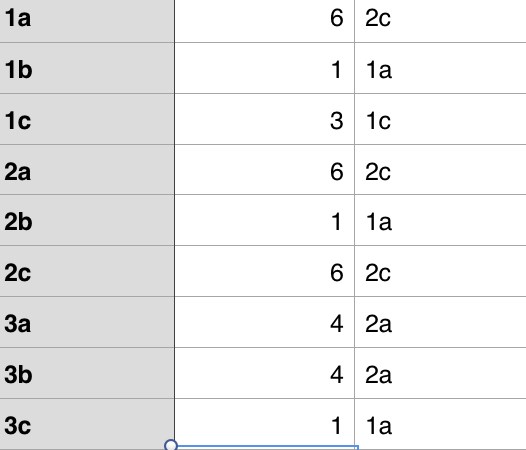Business emails to inspire confidence (not)
 There must be a whole generation of people who know the mechanics of using technology, but have no idea of how to take charge of it. I am thinking in particular of the ridiculous marketing messages I receive, that advertise targeted marketing services. I mention this because, despite all the lambasting of “Office skills”, it is demonstrably clear that people need them. I could even make a case for this being related to digital safety. How? Reputation is important, and marketing messages that have “schoolboy errors” do nothing to enhance one’s credibility. Consider the following examples:
There must be a whole generation of people who know the mechanics of using technology, but have no idea of how to take charge of it. I am thinking in particular of the ridiculous marketing messages I receive, that advertise targeted marketing services. I mention this because, despite all the lambasting of “Office skills”, it is demonstrably clear that people need them. I could even make a case for this being related to digital safety. How? Reputation is important, and marketing messages that have “schoolboy errors” do nothing to enhance one’s credibility. Consider the following examples:5 Things to consider regarding seminars at Bett
Being connected without being connected
 I have finally – finally! – realised what all the Facebook status updates I find so tedious have in common. That is, apart from the fact that they ostensibly have nothing in common, and that I find them tedious. I talked about the things I find irritating in How much should we share online?, so there's no need to rehearse it all over again.
I have finally – finally! – realised what all the Facebook status updates I find so tedious have in common. That is, apart from the fact that they ostensibly have nothing in common, and that I find them tedious. I talked about the things I find irritating in How much should we share online?, so there's no need to rehearse it all over again.Getting the best out of Bett now available
 Over 170 hints and tips from a Bett veteran! Yes, this is my UNOFFICIAL guide. Feel free to download it or share it, via an embed code.
Over 170 hints and tips from a Bett veteran! Yes, this is my UNOFFICIAL guide. Feel free to download it or share it, via an embed code.
Now includes a floor plan!
If you have already downloaded it, you may wish to download it again, as this is a revised edition containing extra information.
Assessing “soft” skills
Do you have anything you’d like to add to the discussion, Terry?
The scene was a meeting at the Edusummit conference at UNESCO in Paris in 2011. The question came from the Chair.
Thank you, but no: everything I was going to say has already been said.
That was my response, because I didn’t see any purpose in repeating points that had not only been made, but also generally agreed upon. In fact, my contributions to many meetings are based on Salvator Rosa’s, dictum:
Be silent, unless what you have to say is better than silence.
The question is: does that make me a good collaborator, or not so good? How do we measure such things? And does any of it matter anyway?
Crafting the perfect eTextbook
 Starting very soon is a 5 week online course called Crafting the perfect eTextbook. I’m slightly biased, because I’m involved in it, but it is shaping up to be really great.
Starting very soon is a 5 week online course called Crafting the perfect eTextbook. I’m slightly biased, because I’m involved in it, but it is shaping up to be really great.
The syllabus consists of, in brief:
Plagiarism in education
Applying computational thinking in the “real world”
 One of the justifications for teaching computing and coding is that “computational thinking” is a useful skill for pupils to have, in order to apply it in wide variety of situations. A worthy aim, but I’ve heard very few convincing examples given. Actually, I don’t think I’ve come across any examples of how pupils might use computational thinking in a broader context, or how it applies beyond the relatively narrow confines of computer science.
One of the justifications for teaching computing and coding is that “computational thinking” is a useful skill for pupils to have, in order to apply it in wide variety of situations. A worthy aim, but I’ve heard very few convincing examples given. Actually, I don’t think I’ve come across any examples of how pupils might use computational thinking in a broader context, or how it applies beyond the relatively narrow confines of computer science.
However, Anna Shipman, a software developer, currently working for the Government Digital Service, believes that a software development approach can and should be taken in other areas of life. In particular, she relates how it proved useful in the context of fixing a leaky roof.
Competing with World of Warcraft
 I’ve just started reading Focus, by Daniel Coleman. If a book may be judged by the degree and speed with which it raises one’s blood pressure, I have to say this is pretty good value. I’m only 3% in, according to my Kindle status bar, and already I’ve found three things to disagree with. And let’s not forget that that 3% includes all the “prelims”, i.e. title and copyright pages, table of contents, and so on.
I’ve just started reading Focus, by Daniel Coleman. If a book may be judged by the degree and speed with which it raises one’s blood pressure, I have to say this is pretty good value. I’m only 3% in, according to my Kindle status bar, and already I’ve found three things to disagree with. And let’s not forget that that 3% includes all the “prelims”, i.e. title and copyright pages, table of contents, and so on. Preparing for the new Computing curriculum: What if #5
 Would it be possible to create a self-referential puzzle or challenge? And if so, could it be helpful in the teaching of computing?
Would it be possible to create a self-referential puzzle or challenge? And if so, could it be helpful in the teaching of computing?6 Ways to respond to requests for pointless data
 So, there you are, basking in your new-found freedom to report to parents what their children can actually do in Computing and ICT, when the data impresario in your school says they want you to supply the school office with a “Level” for each child. And for good measure, they want you to do that four times a term in order to monitor progress. How should you respond?
So, there you are, basking in your new-found freedom to report to parents what their children can actually do in Computing and ICT, when the data impresario in your school says they want you to supply the school office with a “Level” for each child. And for good measure, they want you to do that four times a term in order to monitor progress. How should you respond?Preparing for the new Computing curriculum: what if #4
With that in mind, have you ever researched your own area
Who cares about WALT and WILF?
 I have a confession to make. You see, it’s like this, officer. I can never remember what WALT and WILF stand for. I know they’re acronyms to do with assessment for learning, but I can never recall what the letters stand for.
I have a confession to make. You see, it’s like this, officer. I can never remember what WALT and WILF stand for. I know they’re acronyms to do with assessment for learning, but I can never recall what the letters stand for.
But it’s worse than that, your honour. I don’t even care.
5 reasons schools need computing teachers with expertise in the subject
Getting permission to go on an ICT or Computing course
On this date 4 years ago I published an article that I think is still relevant today.
It strikes me that, what with a new Computing Programme of Study coming into effect in September 2014, ie under a year’s time, Getting permission to go on an ICT course or to a conference is rather timely. Teachers of ICT having to become
Report from the 3D print show
Hi, Richard Smith here from Igloo in Education. I am delighted to have been asked by Terry to do a guest blog post on the 3D print show that took place in London from 7-9th November.
The venue of the event, the Business Design Centre in Islington, sent out a clear message out to visitors: 3D printing should be about innovative design and the encouragement of original business ideas. Of
My analogue program
 When, on my teacher training course, I was told I had create a resource to be used in school, I thought it would be fun to devise a programmed learning guide to the economic concepts of absolute and comparative advantages. Unfortunately, that was in 1974. Word processors were not yet ubiquitous, and home computers had not yet been invented. That came a year or two later. In any case, when I finally did get my hands on a word processor, courtesy of a friend of mine on my MA course, it was slo-o-o-o-o-w.
When, on my teacher training course, I was told I had create a resource to be used in school, I thought it would be fun to devise a programmed learning guide to the economic concepts of absolute and comparative advantages. Unfortunately, that was in 1974. Word processors were not yet ubiquitous, and home computers had not yet been invented. That came a year or two later. In any case, when I finally did get my hands on a word processor, courtesy of a friend of mine on my MA course, it was slo-o-o-o-o-w.A history of data storage and recovery
I once mentioned to the kids I was teaching how useful I found having CD-ROMs to store stuff on. “What?!”, they said. “You had CDs back then?”
Young people always seem to have a working assumption in life that the technology they use only came into existence when they did. Anything else is ancient history. With that in mind, perhaps your pupils will find the infographic below useful and interesting. It charts the development of data storage and recovery from the time of Babbage, in 1834. Along the way there are interesting articles, photos and videos.
EdExec Live - ICT Matters: A conference worth going to
- Good topics, by which I mean not only ones about the latest fad but useful, down-to-earth ones too, and ones that make you think and reflect
- Good speakers, by which I mean people who are experts in their field, and not merely good entertainers
- An opportunity to meet and network with others

